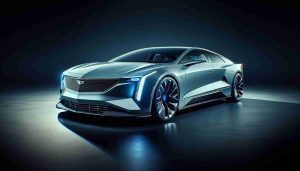Big News for EV Fans! Two Giants Unite for a Game-Changing Partnership

Hyundai and GM Join Forces to Navigate Market Challenges
In an exciting development for the electric vehicle (EV) market, Hyundai has revealed that it is on the verge of finalizing a significant agreement with General Motors (GM) to enhance their commercial EV offerings. The announcement follows Hyundai’s recent financial disclosures, where plans to supply GM with re-badged electric vehicles were highlighted.
Hyundai’s Chief Financial Officer indicated that this partnership will serve as a gateway for the company to penetrate the North American commercial vehicle sector. As the automotive landscape faces evolving market dynamics, both companies are preparing to adapt to the challenges that lie ahead.
The backdrop of this collaboration includes shifting policies under the current U.S. administration, which has raised concerns over potential impacts on sales. Although Hyundai anticipates more complexity in the business environment than ever before, the company believes it can navigate these changes more effectively than its Japanese competitors.
The partnership aims to leverage Hyundai’s new $7.6 billion EV plant in Georgia, where production of models like the upcoming 2025 IONIQ 5 will take place. Furthermore, discussions regarding joint development of specific vehicles, including pickups, have been reported, indicating a shared vision for the future of commercial EVs.
As the market evolves, this strategic alliance promises to bolster both companies’ footholds in a competitive industry, providing exciting options for consumers and businesses alike.
Driving Change: The Broader Impact of Hyundai and GM’s Alliance
The partnership between Hyundai and General Motors (GM) symbolizes more than just a corporate maneuver; it reflects a significant shift in the automotive industry’s approach to electric vehicle (EV) production and commercial strategy. As both companies align their resources to tackle upcoming market challenges, their collaboration could reshape societal attitudes toward EV adoption.
This alliance is particularly timely amid the increasing demand for greener alternatives in transportation. The global electric vehicle market is projected to exceed 26 million units by 2030, highlighting the urgency for manufacturers to innovate and expand. By integrating GM’s manufacturing expertise with Hyundai’s advancements in technology, the duo is poised to enhance the competitive landscape, ensuring more sustainable options for consumers.
In terms of environmental implications, enhanced production efficiency at Hyundai’s $7.6 billion Georgia plant could reduce the overall carbon footprint associated with vehicle production. As both firms emphasize sustainable practices, this partnership may signal a larger movement within the industry toward more eco-friendly manufacturing techniques.
Looking to the future, we may witness an acceleration in EV infrastructure development as Hyundai and GM push for broader adoption. As established players in the automotive market solidify their presence in the EV segment, smaller companies might face increased pressure to innovate or risk obsolescence, ultimately shaping a dynamic and competitive ecosystem. The long-term significance of this partnership could extend beyond business success; it may serve as a catalyst for societal change, promoting a cultural shift towards sustainable mobility and responsible corporate practices.
Hyundai and GM: A Strategic Alliance Shaping the Future of Commercial Electric Vehicles
Navigating Market Challenges in the EV Landscape
In a remarkable shift within the automotive sector, Hyundai is poised to finalize a strategic alliance with General Motors (GM) that aims to enhance their offerings in the electric vehicle (EV) market. This partnership comes at a crucial time as both companies look to solidify their positions amidst rising market challenges and changing consumer preferences.
Pros and Cons of the Hyundai-GM Partnership
Pros:
– Diversified EV Portfolio: This agreement allows both companies to combine their technological expertise, leading to a broader range of commercial EVs that cater to diverse market needs.
– Increased Production Capacity: With Hyundai’s new $7.6 billion EV plant in Georgia, the partnership could significantly ramp up production capabilities, targeting North American markets more effectively.
– Joint Innovations: Collaborating on vehicle development, particularly in segments like pickup trucks, can result in innovative solutions that appeal to businesses and consumers alike.
Cons:
– Market Volatility: The partnership may face challenges due to fluctuating regulations and policies in the U.S., which can impact sales and operational strategies.
– Potential Brand Overlap: As both companies work on similar vehicle segments, market confusion could arise, leading to brand dilution if not managed properly.
Key Features of the Partnership
1. Vehicle Development: Discussions are underway regarding the joint development of specific EVs, potentially including light-duty trucks designed for various commercial applications.
2. Logistical Synergies: By leveraging existing supply chains, the partnership aims to reduce costs while maintaining high production quality.
3. Sustainability Focus: Both companies are committed to sustainability, aiming to minimize their carbon footprints while providing eco-friendly alternatives to traditional commercial vehicles.
Use Cases in the Commercial Sector
The partnership enables both Hyundai and GM to target various commercial sectors, including logistics, delivery services, and municipal operations. With the growing demand for sustainable transportation solutions, their collaborative efforts can lead to innovative applications, such as electric delivery vans and utility trucks.
Limitations and Market Concerns
While the prospects of the Hyundai-GM partnership are promising, several limitations should be recognized:
– Regulatory Risks: Constant changes in environmental regulations and EV incentives may affect deployment and profitability.
– Competition: The EV market is rapidly evolving, with numerous automakers vying for market share, making it crucial for Hyundai and GM to innovate continuously to stay ahead.
Insights on Market Trends
The EV market is experiencing significant growth, driven by regulatory pressures and consumer demands for greener alternatives. According to industry reports, the global EV market is expected to surpass $1 trillion by 2027. As major players like Hyundai and GM join forces, the competitive landscape will likely lead to more aggressive pricing strategies and innovative features in electric commercial vehicles.
Conclusion: A New Era for Commercial EVs
The partnership between Hyundai and GM represents a significant strategic move in the electric vehicle market. As both companies commit to innovation and sustainability, they are set to reshape the future of commercial transportation. With the potential for enhanced production capabilities and a diverse vehicle lineup, this collaboration may redefine consumer expectations and business needs in the coming years.
For further insights into the automotive sector and EV developments, visit Hyundai and GM.



